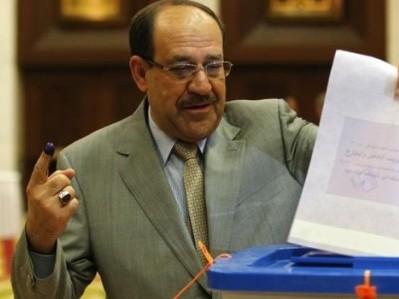PHOTO: Iraqi Prime Minister Nouri al-Maliki casts his ballot in Wednesday’s Parliamentary election.
As Iraq holds its first Parliamentary election since the withdrawal of US troops in 2011, there is a mixed message for Prime Minister Nuri al-Maliki: while the Iraqi people express concerns about his leadership, they value his strong position.
Writing for Al Jazeera English, Barry Malone, argues that although al-Maliki has been in power since 2006, the Iraqi population know little about him — a stark contrast to the people’s relationship with the previous leader, Saddam Hussein.
Even so, the people of Baghdad also see their current leader as strong — a reputation that Maliki hopes will keep him and the Dawa Party in power for a third term. Abba al-Bayati, one of the Prime Minister’s coalition colleagues, has praised Maliki’s “bold” position and reassured that “he knows how to lead the war against terrorism”.
Still, Maliki’s strong stance is not positive for all:
Many of Maliki’s supporters who spoke to Al Jazeera said he combined a humble life with tough political action. For several of his opponents, the reputation for hardness was characterised through aggression.
“We always hear him speaking in a language of blood and violence, like he wants to take revenge on Iraqis not lead them to safety,” Ahmed al-Masari, an MP who opposes Maliki, said.
Other key concerns for the Iraqis to whom Al Jazeera spoke are the country’s precarious security situation and the economy.
Violence spiked last spring in Iraq. The UN said at least 7,818 civilians and 1,050 members of the security forces were slain in 2013, the highest level of deaths since 2007.
Although recognising the importance of voting and the progress accomplished by Maliki’s Government, many expressed concerns over the lack of basic services within Iraq.
Abu Ali, a security worker in central Baghdad, said:
Iraq is a very rich country and there are many clever and experienced Iraqis. But the current government didn’t ask them to help with the country’s development and it hasn’t achieved anything to improve the situation of our country. But, during the 1990s, when Iraq was under economic sanctions, the government was able to overcome that, achieve things and distribute food to its citizens through rations because it did not want to insult them.
This government is the opposite, working to insult Iraqis through arrests, deportations, murder and not distributing wealth equally. And there is a lot of theft, extortion and bribery.
I now earn about $2,500 dollars a month. During the time of Saddam’s regime, my salary was much less. But it was better then, because now, with the insecurity, I fear for my children and my family. And I fear for myself.

